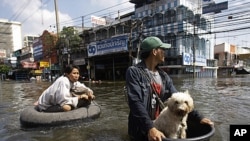Thai Prime Minister Yingluck Shinawatra has invoked special civil powers granted under the country's natural disaster law as Bangkok residents brace for flood waters. The steps by the Prime Minister to streamline flood relief operations follow criticism of her government's handling of the crisis.
Friday, Shinawatra invoked a 2007 disaster prevention and mitigation law giving her full authority to prosecute officials for negligence if they fail to follow instructions.
The move follows days of criticism over her two month old administration's response to the mounting flood disaster, the country's worst in five decades.
The United Nations said Friday 342 people have been killed and nearly 2.5 million more affected by the floods in Thailand alone. Another 336 have died in Cambodia, Vietnam and Laos, where nearly two million people are affected.
The Prime Minister said the armed forces were also ordered to increase protection for key state monuments and buildings in Bangkok, including the Royal Palace utility units and the major airports.
Accountability
Kokaew Pikulthong, a government member of the ruling Pheu Thai Party, says Prime Minister Yingluck has found it a challenge to impose her authority, especially as the government has only been in power since August. Kokaew also said there has been difficulty in some places where people have resisted calls to allow water to flow through community areas.
"[Prime Minister Yingluck] isn't familiar with the official style, she doesn't know who is capable, who is accountable," said Kokaew. "She doesn't know these people well, so when she has a plan or wants to do anything, she cannot. I have said that she works very hard to solve the problem, but many functions or many crews that she has don't work as well as she wants - that's the problem."
Kokaew said there were difficulties in allocating funds and criticized sections of the armed forces for failing to provide sufficient personnel when called on for emergency flood relief.
Officials are now scrambling to prevent major flooding in the capital city, which sits between billions of cubic meters of water from the central plains and its ultimate destination in the Gulf of Thailand.
Public discontent
Opinion polls have shown discontent over the government's public response to the crisis, particularly conflicting official statements on the danger to communities and delays in alerting locals about rising waters.
Buranaj Smutharak, a member of the opposition Democrat Party, says inexperience within the government has been a key factor for the problems.
"It's actually not politics but the inexperience of this current government and its failure in adequately handling the crisis of this flooding," said Buranaj. "Ever since the initial warning came from the Irrigation Department, the governments' central command continuously failed to assess the relevant data, execute the punitive measures and effectively communicate to the general public."
Thitinan Pongsudhirak, a political scientist at Chulalongkorn University, also blamed structural problems within the government, such as overlapping authority and agencies that are not organized to collaborate.
"In a place like Thailand - which lacks policy coordination, which is beset by chronic interagency conflict, flooding disasters like this are likely to have a severe effect," said Thitinan. "And Yingluck's leadership has been lacking. She has strengths and weaknesses. Her strength is that she has good temperament. [But] she lacks decisiveness in a time like this."
Impact
The Industry ministry says more than 14,000 factories have been hit by floods, including major industrial estates, with the loss of up to 600,000 jobs. Annual economic growth has been slashed and the World Bank is forecasting negative growth over the last quarter of 2011.
Economist Somphob Manarungsan says the government's handling of the post flood recovery will be a key factor to its long term popularity.
"After the flooding calms down there will be the reconstruction," said Somphob. "That will be much more important. If the government has a clear policy, correct policy it may still maintain some popularity; but in the end they could not hand the post flooding crisis, well I think their credibility may be negatively affected."
Scientists warn it may take up to six weeks for the floods to fully subside, with economic losses at close $6 billion. But economists expect additional government spending on recovery to boost economic growth into early 2012.
Related report by Daniel Schearf:




